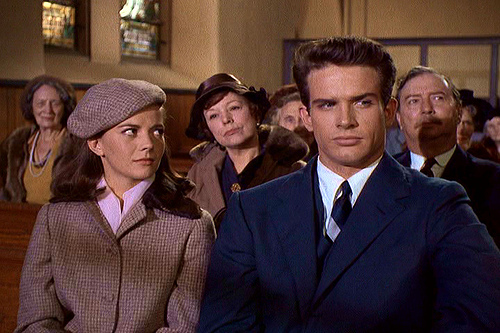 A gushing waterfall. Teenagers kiss, the torrent of their adolescent passion barely held in check.
A gushing waterfall. Teenagers kiss, the torrent of their adolescent passion barely held in check.
Abandon all hope of subtlety, all ye who watch this movie.
Deanie Loomis (Natalie Wood) and Bud Stamper (Warren Beatty, in his screen debut) are high school sweethearts living in claustrophobic small-town Kansas in the late 1920s. It’s the sort of place where the neighbours are constantly peering from behind curtained windows and gossiping is not a pastime, but a religion. Deanie basks in the attention of the most desirable boy in town: Bud is wealthy, a football ace and all hers. The pair can’t wait to be married. Unfortunately Bud’s overbearing father (Pat Hingle) has other ideas. Madness and hysteria inexorably follow.
Splendor in the Grass is all about the evils of sexual repression. I can only assume the irony of setting it in the Roaring Twenties- notorious for its gleeful hedonism and excess- was not coincidental. Bud and Deanie are desperately in love and desperately naive about what to do next. Deanie’s mother tells her girls never enjoy it; Bud’s father advises him to seek the company of less ‘nice’ girls. The town’s entire adult population apparently consists of prudes and hypocrites. All anyone can agree on is that a teenage pregnancy would be very bad indeed. It’s no wonder the sweethearts are confused. I just wish they had an ounce of sense between them.
But this is a film for melodrama, not rational thought. Bud forces Deanie down on her knees and demands that she tell him she cannot live without him. His prodigal sister Ginny (Barbara Loden) drunkenly harangues guests at a family party. And a heartbroken Deanie reads the eponymous Wordsworth poem, bludgeoning viewers over the head with the film’s central theme.
It’s a maddeningly overblown world and it all comes crashing down, like the stock market.
This movie is supposed to be essential viewing. Director Elia Kazan also helmed On the Waterfront and East of Eden. It was a turning point in Wood’s career (she was nominated for an Oscar) and helped launch Beatty’s. William Inge even won an Academy Award for his screenplay- there must have been very little competition that year.
It isn’t that the film is badly made. There are good performances all round and especially impressive ones from Hingle, Loden and the two leads. Rather it’s the two-dimensional characterization that annoys me: adults are useless and teenagers only slightly less so. I could appreciate the twisted, tortured souls in a melodrama like Written on the Wind because I cared what became of them- they were improbable yet sympathetic. Deanie and co had me reaching for fast-forward on the remote control.
Perhaps I struggle with William Inge’s work. I found the contortions of the dysfunctional All-American family in All Fall Down equally irritating and though I am keen on William Holden, could not warm to Picinic.
If adolescent angst and parental incompetence interest you, you might enjoy Splendor in the Grass. I didn’t.
Leave a Reply